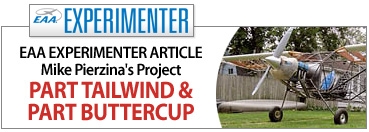Buttercup Epng Vrt-Hrt Stabilizer Kt
Overview
|
We all want to fly fast and land slow. Sylvester "Steve" Wittman solved the problem. Wittman built two types of airplanes: Racing machines and Travel machines. The ancestors of these two blood lines were Chief Oshkosh and Buttercup. The Buttercup was built as a utility hauler, and there was only one made - in 1937. He flew it all over the western hemisphere, from Alaska to Bermuda, Florida to Oregon. The Buttercup almost made it into production (cancelled due to WWII) coming to the interest of Fairchild as a four-place project, called the 'Big X.' One plae was built for them by "Witt" - a 4-place, 6 cylinder, 130 HP Franklin powered prototype. The real genius of the Buttercup design is Wittman's claim of 38-40 mph (indicated) slow-flight speed and a near 150 mph top speed, and all on 85 hp! The high speed is vintage Wittman, the low speed is due to an ingenius flap-coupled, retracting lead edge design (seen in today's airliners). Earl Luce of LuceAir, Inc. has 'revived' the Buttercup, featured in the April 2003 issue of Sport Aviation. Kits and fabricated assemblies for the Buttercup are available from us. For info and plans contact: LuceAir 35 Beverly Dr. Brockport, NY 14420 Ph: (585) 637-5768 website:www.luceair.com email: earl@luceair.com |
Specifications
- Kit Price Without Engine: ~$12,000
- Plans Price: $300
- Number of Seats: 2
- Building Materials: N/A
- Building Time: ~1500 Hours
- Standard Engine: Lycoming O-200 / 100 HP
- Horsepower: 100
- Wing Span: 29.5'
- Wing Area: 132 sq ft
- Empty Weight: 790 lbs
- Gross Weight: 1300 lbs
- Takeoff Distance: 300'
- Landing Distance: 200'
- Cruise Speed: 130 mph
- Top Speed: 150 mph
- Fuel Capacity: 21 Gallons
Reviews
both, the quality of the plans from Earl Luce and the parts from Aircraft Spruce represent a great value. ACS always has competitive prices, ships on time, and in my many years as a builder, has most everything in stock. The Buttercup is among the best classic rag n tube designs and is a lot of fun to build because it is scratch built.
Q&A
Please note, Aircraft Spruce Australia's personnel are not certified aircraft mechanics and can only provide general support and ideas, which should not be relied upon or implemented in lieu of consulting an A&P or other qualified technician. Aircraft Spruce Australia assumes no responsibility or liability for any issue or problem which may arise from any repair, modification or other work done from this knowledge base. Any product eligibility information provided here is based on general application guides and we recommend always referring to your specific aircraft parts manual, the parts manufacturer or consulting with a qualified mechanic.

 Aircraft Spruce Australia
Aircraft Spruce Australia



















